|
|
Ivan Merriman Lewis
his story from 1937 to about 1950
I bought my first car after I came back from my mission in Samoa in 1937 [summer]. I went to Gallup, New Mexico and bought a Model A Ford Coupe. I took it to St.Johns twice before I got married.
The second time I went to Conference. Sunday evening, Daisy and I were sitting on the couch, hand in hand, we had just eaten. Her mother had just gotten up from the table and said, "Are you two getting married?" It had not been so long since I had asked her. Then I said, "Will you marry me?" She said, "Oh, yes." I said, "When?" She said, "How about tomorrow." I said, "Okay." We went from there to the porch to plan it. We got to bed about two A.M. We went up to Jay's and Mable's and got them to come. Then we went to the courthouse and got the license and back home.
There were invited: Hugh Richey, who was the Bishop, who performed the ceremony. Vivian Rencher, Tamer Jones, Elizabeth Stradling, Leigh Richey, Luella Richey, Jay Richey, Mabel Richey, Mary Ann Richey, Katie James and more. Tamer Jones and Elizabeth Stradling signed as witnesses. We had ice cream and chocolate cake. We had our picture taken afterwards. Daisy had a bunch of gladiolas flowers. [August 11, 1937]
We went back to Ramah, where I found a house south of Bond's store. We stayed at Grandma's house until we found one. It was a two-room house, big enough, and that's all. It had a smoky cook stove and that's all. Golden Farr brought a piano that Daisy had bought. Also some other things. We didn't have a potty outdoors for a little while.
The sawmill job at Box S was only part time. And paid $3 per day. I was stacking lumber in the yard. Daisy and I lived for a time in a little lumber shack at the mill. Then came into Ramah where I rented a two-room house from EA. Bond where we lived the summer of 1937 and into the fall.
We didn't get to the temple until the fall, 26 October, 1937. When we came back, Hugh Richey, Daisy's brother, offered me a job driving a John Deere tractor pulling a "tumble bug" to build stock tanks east of St. Johns for Jake Barth and others.
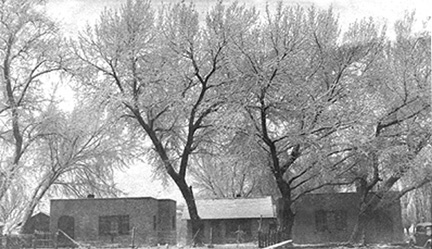
|
In March or April of '38 I went to work for Fred Whiting who was building two houses for my wife's mother to rent. Clarence Rencher and myself went to work on them for a couple of months. We were getting paid at Whiting's store in goods and services. One day I needed money for something and had a devil of a time getting it out of Whitings.
|
Then we went back to Ramah in May 1938 and farmed the "Old Lewis Place" (my grandfather's homestead, three miles southeast of Ramah) with my Uncle Gilbert until fall and winter of 1938. Then back to St.Johns where I hauled and cut wood and sold it together with Leigh Richey, until March or April of 1939.
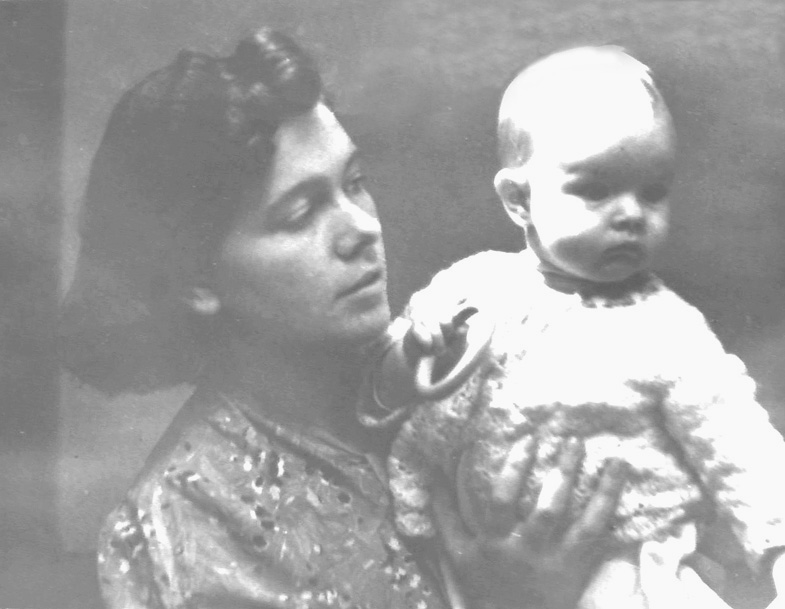
|
My wife gave birth to a cute little baby girl, April 5, 1939. Dr. Bouldon was down to Grandmother Richey's house tending Daisy when the baby was born in the northwest bedroom.
|
I then went to work for Lewis N. Tenney at Flagstaff, Arizona building stock tanks. Later in the year we transferred to McNary where I worked till June 1940. I then went to work for W.A. Becktel at Morenci as a laborer to August 1940. (You should understand this was in the depression years.) Jay and I went to Morenci where they were advertising for work in 1940. There was a long line of people every day wanting work. Jay never did get on.
While there we saw a spectacular sunset. There had been a lot of rain there that day. We had all gotten out in it with the least amount of clothes and really soaked it up. That night there was spectacular night show that went on for hours.
After Jay departed, we moved downtown where I went to work on a part time basis for a photographer, Frank Gabusi. He was a very good photographer and he thought I was too. He sent me to Tucson to meet with a man named Al Buhman, an excellent fellow who trained people to become better. Well, there was a fellow from Colorado who was ahead of me. He told me that if he didn't take it he would take me. Well, the man took the spot and I was out.
I had a very interesting trip to Tucson. I thumbed a ride from here. The first ride I got I thumbed from Clifton. It was a car with three Mexicans in it. They were headed in the right direction. We drove along going slower and slower going up hill, the car was a Model A Ford. And it finally stopped. I told them it I didn't think it was getting enough gas. I took the little bowl off, up front where the gas wasn't coming out, and it was full of water and dirt. I cleaned it out, unplugging it and putting it back on. Well, it started and we took off. It was an open car with no top on it. The car ran very well, we were going better than 60 mph. taking the curves, typical Mexican driving. I wished I hadn't fixed it, well I had. They let me out at some little town where they were going.
I next caught a hay truck. I rode with him till he turned off at another town. I next caught a car that was going all the way to Tucson. Coming back I caught a car that going all the way to Clifton. I was gone four or five days.
We were parked in a trailer park next to my boss. One night my wife woke me up. They were quarreling about something, we heard her get out of bed, then I heard her say, "Shut up before I bury this knife in your big middle," then all was very quiet. Our little trailer had no insulation and theirs had very little. After a while we heard the knife being returned to the drawer.
In a few days it rained and rained. We decided to leave. The roads were muddy going, not paved and it was uphill getting out. It was very uphill, and the trailer was going sideways across the road, towards a cliff. Daisy got out and pushed the back of the trailer up hill to where we got some traction. We got out of stuck. On up the road a ways it was single track, if you met someone coming the other way somebody had to back up. We had a flat tire on the right rear of the car. After a wait of thirty or forty minutes or so here came another car coming down towards our car. He stopped and we had a consultation. His spare would fit our car, so it was decided that I would borrow it till I got to Springerville and got one of my own. I was to leave the spare at the station. He was deputy Sheriff. So we got home.
I decided to haul and cut wood with Leigh fall and winter, 1940-41. Wood was going for $4 a cord, sawed. We did all right. In the spring, Dewey Farr had a farm at Concho that he wanted someone to take over. So I took it. I was a farmer until July 1941.
At conference in April I had met Alma Lambson from Ramah, and we had talked about the work at the Ordinance Depot at Fort Wingate. Alma's younger brother Delbert and his Uncle Gene were on the same crew that I was. We had a loud-mouth boss who was critical of everything on the job. He was a Texan and his loudness irked Delbert into wanting to set him straight. His uncle and I told him he was waiting to get his crew. Not getting on Delbert personally. After a few more days of his hollering he never hollered again. His name was Doc Titus. Delbert asked me, "What's wrong with Doc?" I said, "Nothing, he's just got his crew." The rest of the time he was just as quiet as anybody.
In a couple of weeks we got an award for setting the most forms and the best. After awhile I got on as a "Guard." I wore a pistol and let people in at the gate when they showed their "passes." One day I let a man in on a bogus pass. I was inside when he came back out, I heard the guy that was outside tell him how to go to Albuquerque. Nights were spent in checking the gates and other entries. The place where we were parked was called Outlaw.
There were quite a number of people from Ramah there. We got together evenings once in awhile. There was a couple there that used to go to Gallup, sit in their cars and watch people go up and down the sidewalks and going into stores instead of going into movies. We tried it a few times and it was a lot of fun.
One night we were coming back from Gallup, it had been raining and we narrowly missed an Indian going up the road. Another time we stopped at the Top of the World, at a cafe. While we were ordering, we noticed a couple of outhouses outside. This fellow told us they were wired for sound. He said that a well-dressed lady went to use it. He gave enough time to be seated then he said, "Lady, would you use the other hole, I'm painting down here."
We went back to St.Johns from there, back to the Navajo Reservation, back to work. Ian was born the 2nd of Jan. 1942. He was ugly, when I saw him he was red faced and wrinkled. I said, "Put him back." The nurse smiled and said, "It's too late now." I said, "I'll keep him. He'll probably be the best looking boy I could have." Well, he turned out to be quite a handsome boy.
Well, I went back to work for Hugh, building stock tanks again till May 1942. By May I went to Belmont to work for Ted Page. I was running a "Cat and Can," we were making roads and opening it for "Igloos."
|
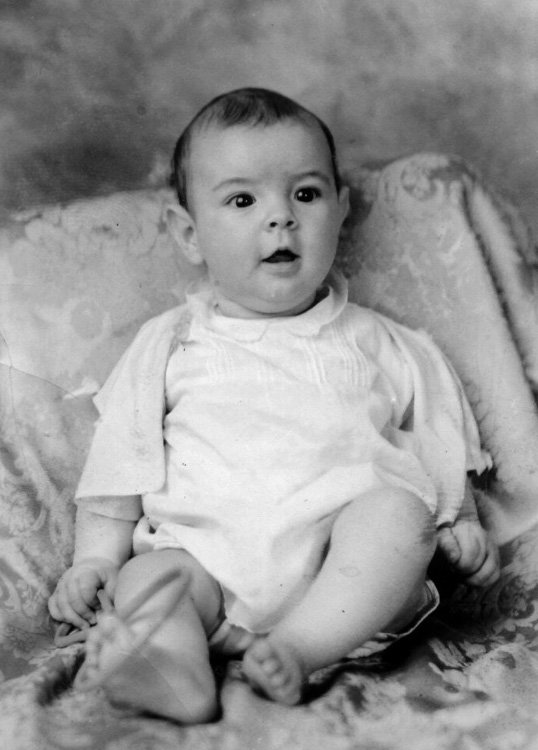
|
I remember a guy by the name of McAllister, everyone called him Mac. Anyway, I thought he knew more about a carryall and digging with it. (Cat 'n Can meant Caterpillar and Carryall.) So every day at lunch I asked, "What could I do better?" I learned a lot from him.
A cousin of mine came to work there, too. Lloyd Lewis was his name. He was an innovator. He learned to shift gears of the tractor "on the fly." Everyone else had to stop to shift gears. One day the superintendent came by and saw him shifting gears and took him down to the Tournapull spread. That's where he could catch them on the fly. That's right, I worked there for seven days a week until the last day of the year.
One morning I came to work, my can was parked. I raised it up and tried to dump it. Ted Page even tried to dump it. When it became obvious that it needed some shop work done on it, he sent it to the shop. Later that day a mechanic came by and sent me to work on another "cat" that was needing some repair. I don't remember what it was but I became a mechanics helper the rest of the day.
The next morning when I came out to work, it still wasn't fixed, so I was sent down to be a helper on another cat. It had a track off and we were putting it back on.
Meanwhile, the fellow that he advised me the day before that it was all right to run the rig and that I couldn't get it dumped, had gone by the office and Mr. Page had told him to give me a "Pink Slip." Now this young mechanic was from Flagstaff and Ted Page knew it. He knew it would cause a "ruckus" and he meant the "pink slip" was from the mechanic to be fired. Now the mechanic that I reported to knew that the other fellow had a "pink slip." He told me that I was to ask for it. When he showed up I said "Good Morning" to him as we kept on working on the "cat." Well, we worked on it for about 30 or 40 minutes and nothing had been said about a "pink slip." I asked him "Do you have a "pink slip" for me?" "No," he said. So I told him "If you do have, it's illegal for you to give it to me, because you're not my boss." "No," he said, "I don't have one." I think by this time he caught on that it was for him and not for me. When I came to work the next morning, my cat was ready. (I also heard that the other mechanic was fired.)
There was a rule about fighting on the job, this was a Federal job. So there was a professional "strong man" on the job. He was the kind of guy that could pound nails through a two by four with his bare hands, and bend re-bar around his arms or legs. This was demonstrated after some "scoffing" by some of men at lunch time, when all this took place. The reason I mention this is, after awhile the boss, who was a little guy, said something to the "Strong man" that made him mad, and he hit the boss in the mouth and broke his jaw. The "strong man" went to jail for it. This job ended in December, 1942.
I needed some extra gas stamps to go to Phoenix to get another job. I loaded my wife and two little ones in to the car and went to Flagstaff to see if I could get some more gas to move on. As I walked into the room there was a line waiting. I got in line. As I moved up the line I heard enough of the talk to convince me that I wasn't going to get the gas that I needed to go to Phoenix.
"What can I do for you?" I told them that I needed to move to Phoenix. He asked me where I had been working. When I told him Belmont, he said that they weren't giving any gas to anyone who was working at Belmont. Flagstaff had well prepared for those who were coming to work there. They jacked up the prices of everything, profiting from it. The move-ins had seen the prices of everything go up so that the Unions had built a store there. Where you could buy everything but gas.
I made some bright remark and was quickly grabbed by two men who shoved me into the back room. Upon looking around to see who had shoved me into a back room, one was the Sheriff. I stood there looking around. There was a fellow there, at a desk who was looking at me. I said, "Well, I'll take my A stamps, my B stamps, and depart."
He said, "Let me see your stamps."
"They are in my pocket."
So I took them out of my pocket and showed them to him. He grabbed them and put them into a drawer and locked them in. I looked at him for a few seconds, then I asked him if he wanted to see a good power play.
"What's that?" he said.
I told him I knew a man over in Apache County who would take an exception to taking my stamps and locking them up. "He lives next door to me. I'll give him a call right now. His name is Levi S. Udall, the District Attorney who would be happy to straighten out a few things for you." The effect was magical, the man promptly opened the drawer and got out my stamps and handed them to me.
I said, "Thank you, I'll be going now."
The Sheriff accompanied me out the door. He said that if they had kept my stamps he would have accompanied me to the jail, which was right up the street from there.
There was an attempted rescue. The fellow that ran the same "cat" that I did on the swing came in the door while I was being shoved into the back room. He made a move to rescue me, but was blocked by a couple of other guys and was asked if he knew me. He said yes, he knew me, that I had worked the day shift, and he worked the swing shift. His wife came in right behind him and rescued him.
I walked to the car which was parked there. My wife was waiting there for me. I was grateful for her. We were nearly packed and ready to go.
The story of the propane truck that sprung a leak. This was in St. Johns on a day that was hot and muggy and everything was quiet. The fellow that brought the truck in for repair parked it and left. It was inside the garage. (It should have been parked outside, because of the leak.) By the time someone got to it to fix it, it had let off quite a bit of gas. When he lit his torch the whole thing ignited. When he couldn't see what to do, it was already too late. He abandoned the truck and ran outside crying, "Fire, fire."
Well, everyone looked at the fire and abandoned the place. (It was on a block where the county started. It was only a quarter of an ordinary block wide and a block long. There were several businesses on the block, including Wilber's store on the other end to the west. Then there was about equal space from there across the street to Carroll's service station. To the other end was the post office.
I don't know how come I was there, but I was. I would guess it was by invitation. The whole block seemed doomed to destruction. I was working in the basement of Wilber's store, there were several of us working there. I had just unloaded a sack of something into a truck at the rear of the store, and BOOM went the butane truck and the whole building shivered. I was standing in the doorway of the store and here came the rest of the men who were unloading the building. By this time there was a lot of timber up in the air and coming down. I hollered STOP and waved at the men and boys, but they kept on coming. I moved inside and they ran out to the truck. About that time there was a whole load of burning timber lit in the middle of the truck. Here they came back as fast as they had run to the truck. By that time it had quit falling. Then we undertook to get it out of the truck.
Eldred Jarvis was up on the roof with a water hose. The moment that it blew up he turned tail and headed west in high gear, running as fast as he could go. The roof was nearly twenty feet from the ground. He went sailing off as fast as he could run. His legs were working as fast as if he were on the ground. He lit running, did not fall down or anything, but ran off into the sunset.
Carroll Shumway and his wife were standing part way up the sidewalk; he ran as fast as he could go dragging his wife behind him as she couldn't keep up with him.
The sheriff was speaking to Harold Greer. He turned and moved off. As the BOOM went off he turned and saw the sheriff killed beside him. He also saw ______ Wilhelm die beside him. Darwin Grant was crossing the street and looked up just in time to get hit on the head by a burning 2x4 and go down. Harold pulled them all to safety inside Patterson's garage. There were others who helped Harold.
Sister Hale was crossing the street on the north end when it blew, and it hit her just below the hip and tore her up considerably.
It blew 2x4s as far as a quarter mile away. It took quite a while to rebuild.
Following are some church jobs I have tried to do: Ward Genealogy Chairman, Sunday School Teacher, Y.M.I.A. President, Elders Quorum President, Explorer Advisor, Deacons Quorum Advisor, Sunday School Superintendent, West Samoan Missionary '34 to '37, St. Johns 2nd Ward Genealogy Chairman, Teachers Quorum Advisor, Casa Grand Sunday School Teacher, Genealogy Teacher, Stake Missionary with Joel Perry, President 104th Quorum of Seventies with A.R. Ivins, ordained a Seventy by Matthew Cowley 1952, Stake Mission with C.F. Webb.
Vision of the Horses:
After I finished there [Gallup?] one Friday night I was going home in my little Model A car. (The brakes weren't very good). As I came up the road there was a curve around to the right and I saw what was there before I got there. It was an Indian girl with a herd of sheep. I kind of wondered about that. Why was that so important. Humm.
Before long I came to another curve in the road. Hummm. I was going up hill this time and all of a sudden I saw a man walking up the road. (I hadn't seen him. I had only visualized him.) I came over the top and there he was. I had made up my mind to pick him up when I first saw him. (In my mind.) It was a Navajo and I stopped and I asked him if he would like a ride. "Sure," he said and I opened the door and he got in. Well, I thought that's the answer. I have poor brakes, that's it. Well, we rode along for about five miles. "That's where I live," he said pointing to the hogan up the hill a little way. I stopped and let him out.
I went on down the road to where it crossed a wash. On the other side there was a hill. I was gunning the car to get up the hill, suddenly I saw horses on the other side of the hill, all over the place. (Now I saw horses in my mind. I didn't see actually see them). I geared down with all the brake that I had. I got second gear, still going, got Ist gear, still going, by that time I could see over the hill. Horses, horses everywhere. I couldn't see an opening anywhere, not to the right, not to the left. All I could think of was to toot my horn. So I tooted it and got through.
That was a real constricted place; to my left there a cliff with some corrals sticking way out almost to the road. On the right was a house equally sticking out and just a narrow road in between.
I was very thankful to get through without hitting any horses. I said a little prayer thanking my Father in Heaven for the visions that I was given to save me from cracking up. I don't know what my family would have done without me.
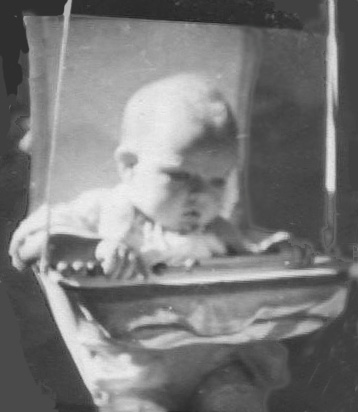
|
When Tani was born we were living in Aunt Roxie's house in Ramah. He was a good baby until
he was about three months old. Then he began crying a lot. The nurse said he was fine, except he wasn't getting enough to eat, so we gave him bottles in addition.
|
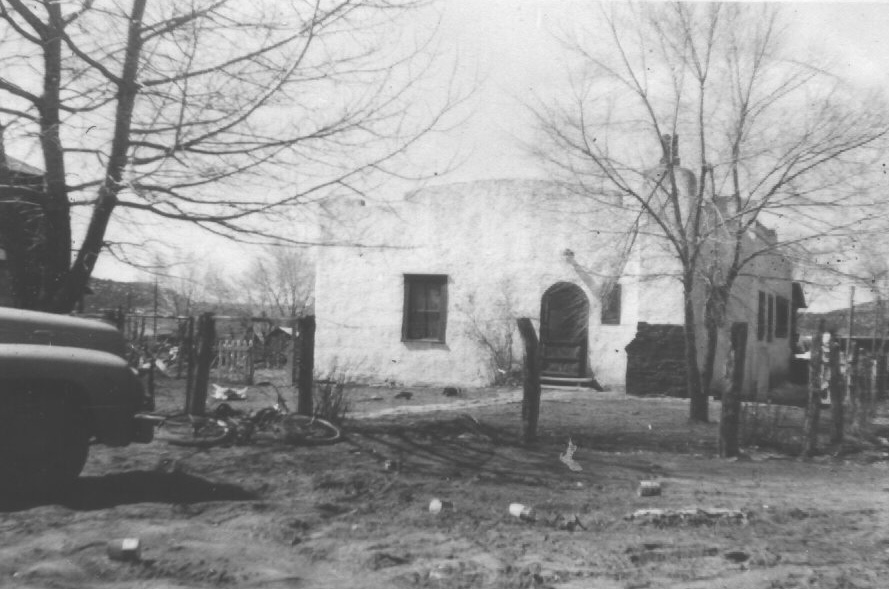
|
In the fall I met a man who said, "How about hauling cattle into Gallup for me." I said, "Okay, what's the deal?" "Haul the cattle to Gallup for me for so much and I'll be happy."
So it was that I hauled cattle into Gallup from McGaffey, Ramah, Points North, Zuni and all around. I remember I took a load of cement out to Ramah from Gallup once, I didn't have a permit to do so but I did it anyway.
Mr. Kelsey from Zuni saw me coming and waved at me as I drove to Ramah with my load of cement. Well, he stopped the inspector from Gallup and had a long talk with him. Meanwhile me and the cement rolled on into Ramah. At the trading post we quickly unloaded the cement, washed the truck and I was picking up the load of cattle when the inspector caught up with me. I was nonchalantly loading cattle. He looked the truck over and couldn't find a sign of cement. So the only thing he could do was walk away from it.
Another time we had gone North for a load of cattle. There was a Navajo who had a bull who was quite mean to take to the slaughter. He had him up about 5 miles from there, so we went after him. He was standing in the corral anchored to a post with a rope around his horns, tied up pretty tight. He'd evidently been there all night, so we untied him and turned him loose. He just walked to the truck and up the ramp into the truck. Well we thought, He wouldn't need tying up again.
(Now there were three compartments in the truck, we left them open). Bruce was driving the truck, there was another fellow between us, and I was on the outside. We were going down the road, all talking and I was watching the bull. Pretty soon he made a run for it but Bruce wobbled the truck and the bull lost balance. A little further down the road the bull ran for the front of the truck and jumped out. He came out on my side of the truck and hit the ground on my side, slid into a culvert marker and it turned him over.
We stopped and looked the situation over. It looked as though we were going to butcher him there. Well, he eventually got to his feet, up the ramp and in. We finally got to the other place to pick up the other cattle and loaded them. When we got to Gallup and unloaded them, the bull was the last one out. We didn't figure he would last the night. Well, we went to see and sure enough he was lying down. As we watched he slowly got up.
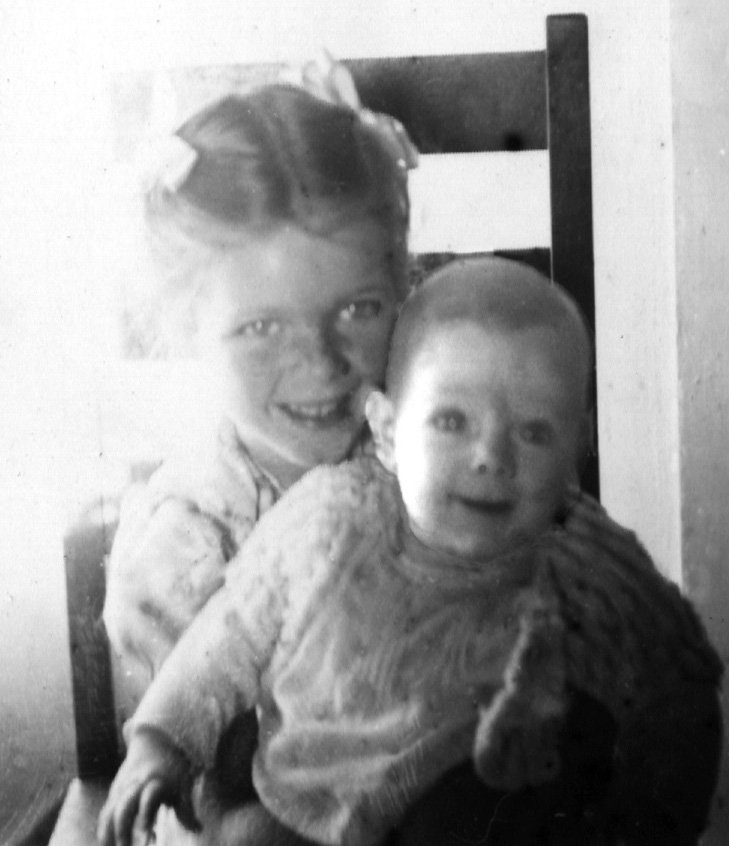
|
Sharon was born in the little red and white striped house that I bought from Frank Lambson for $50.00. We hadn't lived there very long until she was born. It was the 27th of September, 1944. She would lie in the shade of the tree and stay relatively quiet. When Mom would move her she would cry like her heart would break. She would miss the movement of the leaves.
|
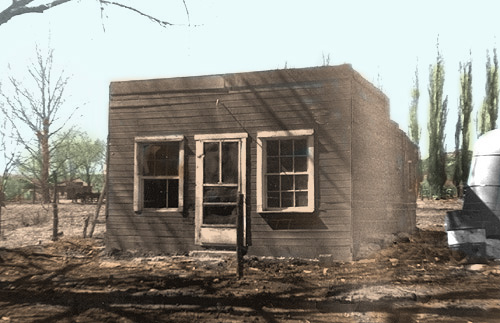
|
It then became necessary to move to St. Johns right away to go to work for Hugh Richey. He was paying 50 cents per hour, which was the going rate at the time. Shortly after I heard that the going rate at Albuqerque was 75 cents an hour which was a third more. So I quit Hugh and went there. I found that I could work there for more. I had first contacted the draft board and told them my plan. And had gotten their approval.
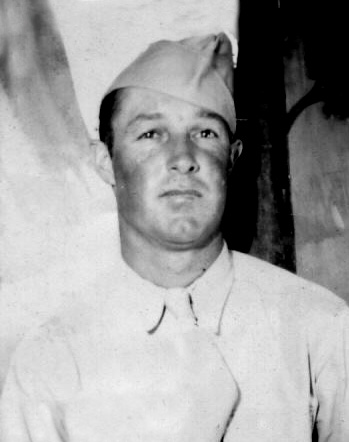
|
Well, it worked out all right except that Jake Barth found that Hugh couldn't replace me to build his stock tanks. So he got mad at me for quitting Hugh. And so he made arrangements to have me drafted. Well, I had to move back to St. Johns to get ready to go. And that's another story.
|
After discharge we went to Albuquerque. To Santa Rosa, New Mex. So we had to build a dam there. We worked on it till one day Al got stuck on it with a load of sand. (Now Al never got stuck anywhere with anything. We offered to push him, to pull him out of being stuck. But he got mad. And quit. Now this was on the inside slope of the dam, a "three to one" slope and he was "prittying" it up when he got stuck.) After he had left I parked my outfit and another outfit tied on to the front and pulled me out of stuck. We worked on it another 2 or 3 weeks and finished it. Then we moved back to Albuquerque.
From there to Bloomfield, N.M. Floyd rented two cats and cans to F. M. Limbaugh to use on a job there. I was to run one outfit and to see that both outfits were greased, etc. We worked there a month or more. Then the guy on the "sheep's foot" kept after me to trade for a little while and let him have some experience on a cat and can. So I did finally. This was just before noon. When just at noon time we were both at upper end of the spread, I kicked in to another gear and was racing to the end when I became aware that my sheep's foot broke and came apart. Well, I stopped and there it was, all torn up. Well, he fired me on the spot.
I called Floyd and told him what happened. As a result he came and picked up both his rigs and back we went to leveling land. We leveled land till June 1946. (Floyd got killed in a car wreck. I went to his funeral.) There was at that time a rig you could tie to the ripper in behind a cat, it was called a bore." It was about 5" in diameter and left an underground hole. It was used to drain soil that was part clay. It was about a foot long.
I went to Los Alamos, N.M. in June 1946 to work in the most exclusive spot in New Mexico. It was the home of the atom bomb. (It was first fired off at the "Malpais" lava beds west of Carizozo, N.M. Then transferred some 200 miles north to Los Alamos.) Our equipment was used some 8 years later to pick up and bury, then take fresh new dirt and cover the area. (So it wouldn't contaminate the area.)
I was cleared as a dozer operator. The first operator I contacted was Jim Voght. He was a quiet fellow, an unassuming guy. I immediately liked him.
We were building another new road in to the south side. I was sent with another fellow to "pioneer" the upper hills of the road up ahead. His name was Bill Switzer, another life-long friend. We pioneered a lot of roadway together.
When we got rid of pioneering we went pushing the "carryalls." I didn't do much of that because I didn't have a "bellypan." This was a rock guard fastened on underneath the cat to avoid contacting the "bellypan."
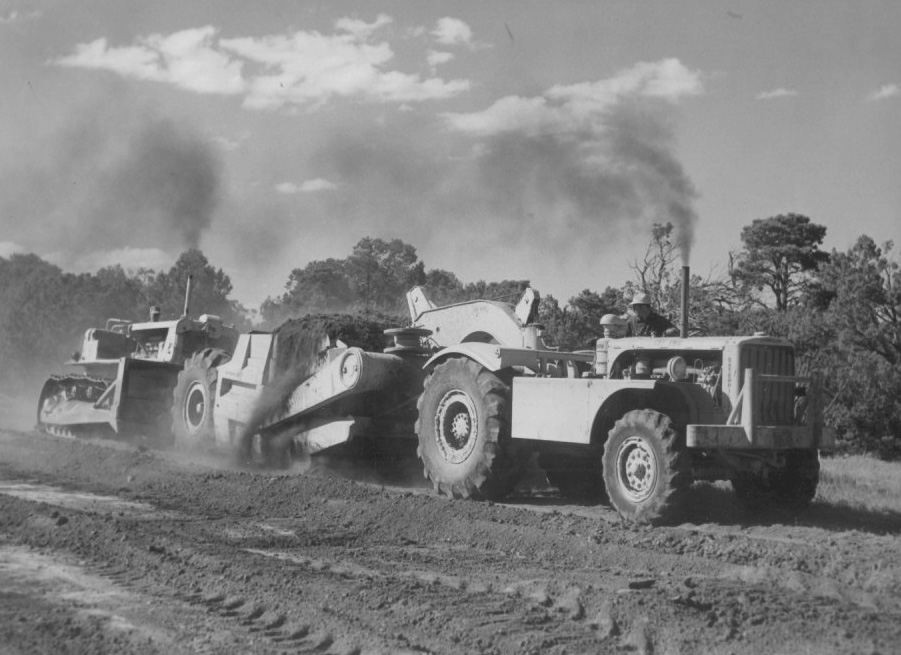
|
One of the first projects I got into was a housing project. It was a 450 house operation. This was in a semicircle, built into a hill. First, we had to dig them out of hill. The place for the houses. Then level up streets. (The gas lines, the water lines, the sewer lines, the electric lines, all had to go in following our "rough in.") Then we built the house pads, put the houses on it. Then we dozed all the excess dirt away form the houses (with a crew of Mexicans cleaning up next to the houses.)
|
One day I got clearance to go to "R" site help bury "BOMB," one 50 ft deep. It was in a room 6 ft x 5 ft at bottom the shaft, back under. The shaft was 6 ft x 8 ft deep. I was supposed to bring 2 lunches as they didn't know how long it would take to cover it up. Well, I brought two lunches and I didn't go. I had been thinking about it and it seemed to me that I should have someone else with me as I could break a cable or something else go wrong, so I should have another. Just in case. So the next morning I had two lunches and a companion. We drove the tractors up there. As soon as we came in the gate they checked our passes and as we came through the gate they asked us to turn our tractors off because they might cause a fire. As soon as they had them off a couple of guys came in with a welder; they fired them up and started to cutting off the roof they had put up to keep the rain off. Jack and I had to laugh as they began cutting.
There were several chairs parked in two rows by the project. We were invited to sit with the rest of them, there was the science guy with them and several dignitaries with them. I asked the science guy about the project and he said in twenty years they were going to uncover the project and see what was left of it. He said that it had a "half life" of 20 years and they would have a look. There was a big pile of gravel that we would use to cover it up with.
Well, we started our "cats" and started covering it up, alternating loads. We were working in second gear, after about 20 minutes a funny sweet smell started to come out. I motioned at Jack, "4th gear," and we started putting it in faster and faster. Well, we covered it up, and took off up the hill. We both stopped our cats and stopped and looked back to see if the ground popped up. We heard the boom and left.
One day Russ came to move my cat and can. It was winter time and was slick. Russ placed the blocks back of the bed where I was going to load. I started up the blocks with my cat and when I got to the place where there was a balance my cat pushed the blocks forward and the cat started to tip backwards. I quickly released the clutch to keep from turning over backwards and the cat came rolling back down to the ground. Well, we placed the block back, only a little forward and tried again, this time we were successful. We loaded all right.
Dan Handy was a good dozer man and had been promoted to boss. He had started a road job south of town. He needed another push cat. So I was disbursed to him. Now Dan didn't like me because I had gotten a house up the canyon, part way up the hill where Loudermilk had established a repair camp. There were three dwellings there. Bill Switzer got one, I got one and the secretary got one. (The secretary was a one-legged man.) The houses were rent free. Anyway, I was sent down to Dan.
One day after being down there I got a rock through my cat's bottom, "the belly pan." This was in the morning. I waited for Dan to take me back to my car which was parked up town. It was after lunch time when I walked out starting up the road on foot. After I had walked part way here came Dan and picked me up and took me to my car. I didn't turn my time card that night, because I wanted to talk to the union man in Espanola about how I should turn in my card. He said to turn it in for all day. So I did the next day. They were waiting for me to turn it in. The minute I turned it in, there was a "strike on" and all because of my turning in my time card. Well, technically I was right. The "Union met for three days" with Loudermilk Inc. and they decided to terminate me. O.K. so I was fired. I said Good-by and left. (There were 9 other of the men left at the same time. I didn't ask them to go, they just quit.)
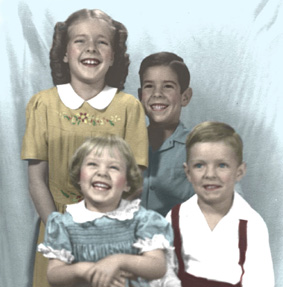
|
There was more to moving up to the Canyon after Loudermilk acquired the houses and the shop place. It was some time before Bill Switzer and I asked if we could move in. After we got the lights and water in, it was all right to move in. We lived there quite awhile.
|
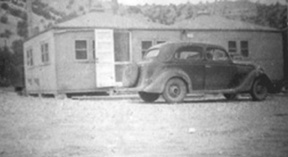
|
There were a couple of lady missionaries found us up at the place we had at Ranchitos. One of them was Ailesando and the other one was ________. Well, my wife welcomed them with open arms. It was through them that we discovered the branch there. It was a Spanish Branch. We could participate. Bill Switzer and his wife also attended. (I even blessed the sacrament in Spanish a few times.) We had a class in English. It was a very small branch. There was a family there that owns a garage. He was a very good man, and his wife and kids were O.K. His name was ______
We moved back to St.Johns. I went to work for Bowen & McLaugulin out north of St. Johns. They were going to pave the whole thing. I lived at home, drove to work. I then went to work for Hugh Richey, a road job into McNary where I worked till May 1949. We had a misunderstanding about the Union. (This was the first job he had working Union rules and I was running a dozer; when the power unit needed adjusting he insisted that I do it. I didn't have the tools so I got fired.) This was just before David was born.
|
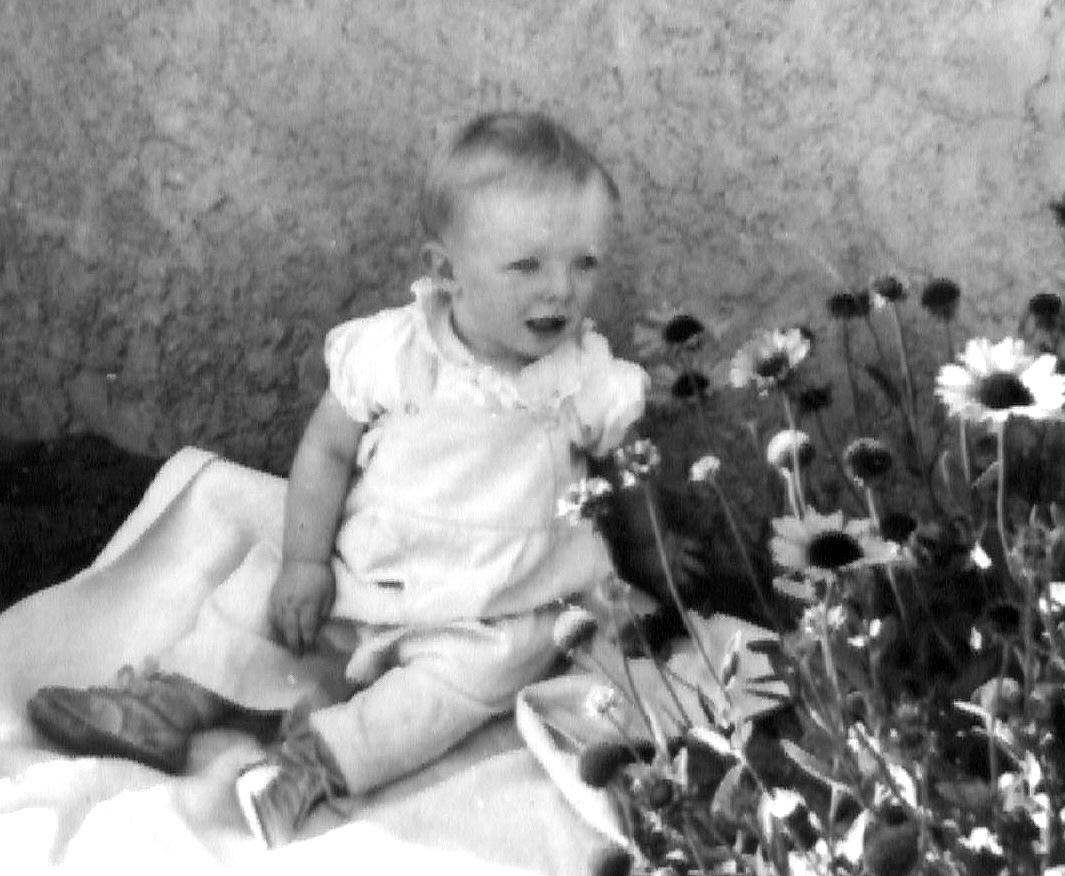
|
Dr. Ellsworth examined Daisy and decided that she needed a hysterectomy. She suffered through it. It was a long time before she recovered, even partially.
I then went to work for Wallace & Wallace out north on another section of the road there. I first heard of George Willitt. He was the superintendent for Wallace & Wallace.
One time there was a small stretch of the road that had the "A-B" piled on it and it needed laying. Well, a dozer wasn't the machine to lay it, but I was there, it was there, I didn't have anything else to do. So I laid it. When George came back it was laid. He looked at it and said, "Well, good enough."
George didn't like truck drivers. He had a truck serviced out in the "boonies" one day, and told the driver it was ready to go. They told the driver it was ready. And the driver took off with the bed still up and there was a lot of bumpy grass growing, and the truck was weaving back and forth. George couldn't run fast enough to catch the guy and tell him to put the bed down. (You see what I mean.) I had a good reputation with them and worked till the job was finished.
Packard was the next job. This job was at Sanders at the north end, where it came into Hwy. 66. The railroad tracks, across the tracks to the north was Sanders. We were getting our fill dirt north of the railroad, transporting it across the railroad tracks up on to the fill. This was built quite high, as it was part of the roadway. It must have been at least 20 ft. high at the north part, then tapered down south 4 or 5 ft. at the other side. I was running a Tornapull part of the time.
I had run the slope side of the fill (on my right side and had made my right turn off the fill and my right side didn't recover and I ran into the side of the fill where I stopped. Well, the right side had worn the cotter key out, and it had dropped the pin out of the hole and left my right side without steering. We got that fixed, checked the other side, put in a new pin and back to work.
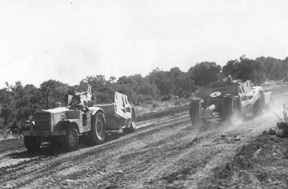
|
We had a man at the track to flag us when a train came through. He bore watching, if he was waving his flag, it was time to stop. He was pretty good. One day a scraper caught the right track of the railroad and pulled it out of alignment with the other track. Quick as a wink he took off down the track and stopped the train before it got to the place where it could be wrecked. It took quite a while to fix it.
|
Another day the flag man had his little boy sitting on a rock beside him. As I was about to pass beside him, I stuck out my finger and pointed at him and said Boom. Just as I said it my rear tire blew. The little fellow rolled off the rock backward and recovered. I had to pull off the road to the right and fix my flat. I had to pull up and dump the load off the rig then park it off the road where it was quite smooth so they could fix the tire.
There was another time when we were hauling from a pit that was south of the road. Up to the road quite way before we got to where we dumped. There was a man standing on top of the pickup waving his arms in the air. He had the other half of my drawbar coupling in his hand. I took it out of gear, and came to a stop and tested it if it were not to roll and got off. (Well, there is a safety cable tied on underneath for just such emergencies. So they hooked it back up. They took the responsibility for letting it down to where they could hook it back up.)
I later saw what happens when the safety cables come undone. We were coming on the road and coming on in half circle, then back down the road, and dumping coming down hill onto the road. The fellow just ahead of me made the turn in front of me turned on to the road. Just as he turned onto the road his safety cable parted and the front of the rig turned up and he stopped in a cloud of dust. He climbed out. Now, his "can" hit the high dirt on top of the fill just in time to keep it on top. I turned just the other side of him and could see the results. (The Lord had his arm around him, no doubt about it.)
They steered by means of two steering clutches one on either side. If you were pulling, that is, going up hill you could steer it, you could steer it by going directly, that is by pulling the right clutch out briefly and pushing in again. If you were going downhill you pulled your left one and pushed it again. If you were on the flat (level) you could push down the brake and steer as if you were going up hill. If you had no brakes you couldn't steer. That was the most fun. You could pull them both out, you might be able to cross friction, and steer. That's what made it fun if you had no brakes...
|
|












